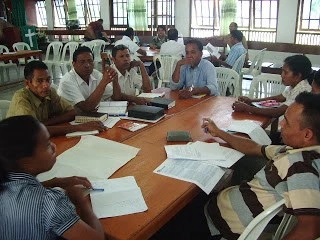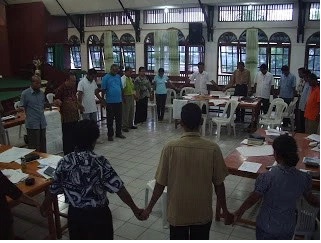Ecumenical Enablers Training in Timor Lorosae
Ecumenical Enablers Training inspires 'Unity of Churches, more pastoral training, need for a Theological seminary and Bible in native Tetun language'....... An Ecumenical Enablers Training held in Timor Lorosa’e, introduced to participants from the Protestant churches, the ecumenical vision and mission of the CCA, and its role in promoting unity, not only among the churches but also among people of Asia through the reconciling and healing ministries of the church.
This program which was the first of its kind to be held in Timor Lorosa’e, trained 28 participants from the Protestant Churches, comprising pastors, evangelists, church leaders and young people, in Ecumenism and other aspects of  fullness of life for all. It is also considered as a major step towards peace and harmony, especially in the context of Timor Lorosae which is struggling to stand on its own feet in the aftermath of the independence struggle.
fullness of life for all. It is also considered as a major step towards peace and harmony, especially in the context of Timor Lorosae which is struggling to stand on its own feet in the aftermath of the independence struggle.
 fullness of life for all. It is also considered as a major step towards peace and harmony, especially in the context of Timor Lorosae which is struggling to stand on its own feet in the aftermath of the independence struggle.
fullness of life for all. It is also considered as a major step towards peace and harmony, especially in the context of Timor Lorosae which is struggling to stand on its own feet in the aftermath of the independence struggle.Churches in Timor Lorosa’e are yet to crystallize into a strong unified national Christian presence. The estimated 80 pastors including evangelists feel that they are in need of more leadership training, on-going pastoral education and ecumenical formation. They regret that they do not have their own Theological Seminary nor a Bible in their own native Tetun language.
The training inspired them to think in terms of promoting unity and solidarity among the churches and suggested having regular meetings and ecumenical worship services with the neighbouring churches on special occasions like Easter, Christmas and Independence Day.
 The training that focused on the theme “Called to Reconcile and Heal the Household of God,” emphasized wider ecumenical vision that included church unity, common witness of the Gospel, and the reconciling and healing mission in the local contexts. A general orientation on the theme from all aspects including one from the perspective of God’s creation, was given by Rev. Jung Eun Moon, Executive Secretary of CCA – FMU. A brief history of the ecumenical journey of Christian churches in Timor Leste was shared by Rev. Albino da Costa. The training was enriched by meaningful Bible studies and had informative and thought provoking sessions that covered all aspects of community living, such as, healing of communities divided by racial and ethnic conflicts; gender justice and healing of broken families; and an overview of HIV&AIDS and healing ministry for the disabled. The sessions were effectively handled by Rev. Albino Pinto from Timor Lorosae, Rev. Krise Gosal from the Communion of Churches in Indonesia and Dr. Alphinus Kambodji, CCA Consultant for HIV&AIDS, respectively. Communicating with the participants in Bahasa Indonesian language, made possible by Rev. Krise Gosal and Dr. Kambodji was one of the major factors that contributed to fulfilling the goals of this training program. The participants hoped that CCA will continue to provide more training programs for the pastors and evangelists of the rural areas to improve their pastoral skills. This training is part of the CCA-FMU Ecumenical Enablers Training.
The training that focused on the theme “Called to Reconcile and Heal the Household of God,” emphasized wider ecumenical vision that included church unity, common witness of the Gospel, and the reconciling and healing mission in the local contexts. A general orientation on the theme from all aspects including one from the perspective of God’s creation, was given by Rev. Jung Eun Moon, Executive Secretary of CCA – FMU. A brief history of the ecumenical journey of Christian churches in Timor Leste was shared by Rev. Albino da Costa. The training was enriched by meaningful Bible studies and had informative and thought provoking sessions that covered all aspects of community living, such as, healing of communities divided by racial and ethnic conflicts; gender justice and healing of broken families; and an overview of HIV&AIDS and healing ministry for the disabled. The sessions were effectively handled by Rev. Albino Pinto from Timor Lorosae, Rev. Krise Gosal from the Communion of Churches in Indonesia and Dr. Alphinus Kambodji, CCA Consultant for HIV&AIDS, respectively. Communicating with the participants in Bahasa Indonesian language, made possible by Rev. Krise Gosal and Dr. Kambodji was one of the major factors that contributed to fulfilling the goals of this training program. The participants hoped that CCA will continue to provide more training programs for the pastors and evangelists of the rural areas to improve their pastoral skills. This training is part of the CCA-FMU Ecumenical Enablers Training.CCA has been proactive in training pastors, church leaders, youth and women leaders through very intensive courses in similar contexts in Nepal, Cambodia and Vietnam.










